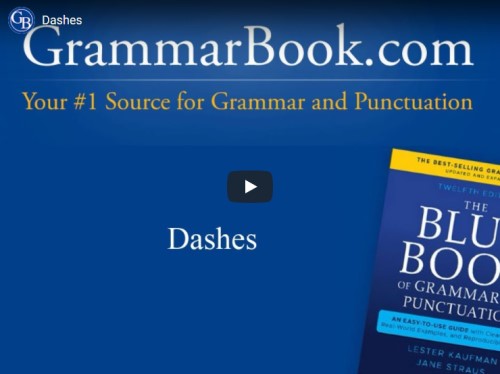|
Having trouble viewing this message? Click here to view it online.
To unsubscribe or change contact details, scroll to the bottom and follow the link.
|



|
|
Tackling More Tricky Word Choices: Another Look at Number Is and Number Are
|
|
Recently we've been reviewing word choices with nuances worthy of
noting. Understanding subtleties of meaning and usage makes the instruments
in our toolboxes even sharper for precise and eloquent writing.
Today we'll look at another English-usage item that can sometimes be
tricky even for experienced communicators.
When using the word number as a collective noun for countable
items, which statement would you use?
A number of factors is weighing on her decision.
A number of factors are weighing on her decision. |
In
The Number vs. A Number, we put forth that number with the singular definite article the would be followed by a singular verb while number with the singular indefinite article a would prompt a plural verb. Thus, of the examples above, we would use:
|
A number of factors are weighing on her decision. |
This guideline remains useful for subject-verb agreement in writing. At the
same time, number may still pose a greater challenge to agreement
than a collective noun such as none. None can more easily
lend itself to a plural sense ("not any") as well as a singular
meaning ("not a single one"). This frees the object of the
modifying prepositional phrase to help govern verb usage.
Examples
None
of my co-workers are going to the
seminar. (plural prepositional object, plural verb)
None
of the team has reported to spring
training yet. (singular prepositional object, singular verb) |
What makes none more versatile is its lack of a preceding article.
When acting as a subject, number will always require an article,
often creating an underlying instinctive sense of quantity. This informed
our earlier guideline for subject-verb agreement.
Depending on your circle of influence, some writers, instructors, and
grammarians may insist that number is always a singular collective
noun. Technically, their argument would pass inspection, just as our
guideline would.
In the end, the truth comes down to what sounds right to your
writer's ear and whether you want to emphasize a plural or singular
image. Number could be singular to you at all times, or it might
seem either singular or plural according to its context. If ever
you're in doubt, you can apply our guideline of the number = singular verb and a number = plural verb and know your writing is
still moving as it should.
|
View and comment on this
article on our website.
|
|
|

|
 |
The Blue Book of Grammar and Punctuation
by Lester Kaufman and Jane Straus |
The Authority on English Grammar! Twelfth Edition Now Available
An indispensable tool for busy professionals, teachers, students, homeschool families, editors, writers, and proofreaders.
Available in print AND as an e-Book! Over 2,000 copies are purchased every month!
To order the book, simply click the link to order the book from the GrammarBook.com website.
|
Free BONUS Quiz for You!
Friend, because you are a subscriber to the newsletter, you get access to one of the Subscribers-Only Quizzes. Click here to take a Confusing Words and Homonyms Quiz and get your scores and explanations instantly!
We will be adding many more quizzes this year to our already substantial list of them. If you have suggestions for topics we have not yet covered, please send us a message at help@grammarbook.com.
|
Hundreds of Additional Quizzes
at Your Fingertips
Subscribe now to receive hundreds of additional English usage quizzes not found anywhere else!
Teachers and Employers
Save hours of valuable time! You may assign quizzes to your students and employees and have their scores tallied, organized, and reported to you! Let GrammarBook.com take the hassle out of teaching English!
"Fun to test my skills."
"The explanations really help ... thanks!"
"I can select the quizzes to assign to my students, and then the results are reported to me automatically!"
If you think you have found an error in a quiz, please email us at help@grammarbook.com
|
Wordplay

|
 |
English In A Snap:
68 One-Minute English Usage Videos FREE |
Learn all about who and whom, affect and effect, subjects and verbs, adjectives and adverbs, commas, semicolons, quotation marks, and much more by just sitting back and enjoying these easy-to-follow lessons. Share them with your colleagues (and boss), children, teachers, and friends as well! Click here to watch.
|
|